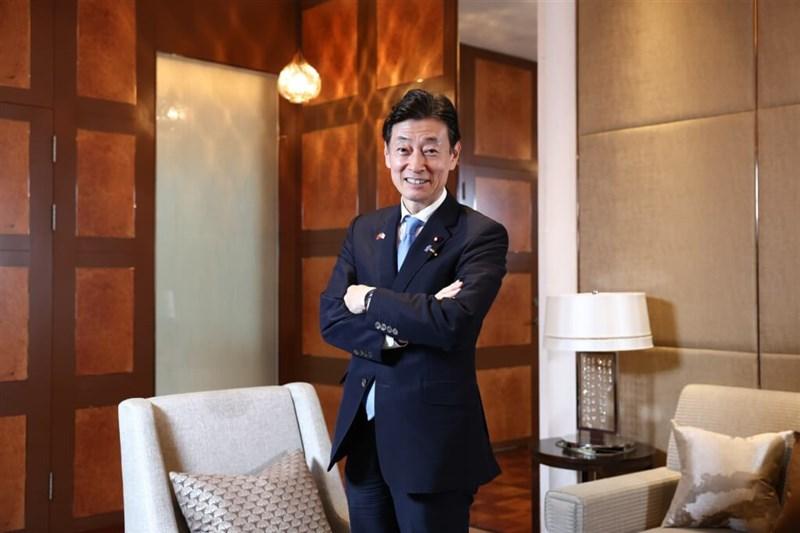A former Japanese economics minister visiting Taiwan yesterday said that Taiwan, Japan and the US are establishing closer trilateral cooperation in the semiconductor industry, forming what he called a "semiconductor iron triangle."
Former Japanese minister of economy, trade and industry Yasutoshi Nishimura, a current member of the lower house of the Japanese Diet, said he came up with the phrase "semiconductor iron triangle," because global semiconductor powerhouse Taiwan Semiconductor Manufacturing Co (TSMC) has a presence in Japan and the US.

Photo: CNA
TSMC has a factory in Kumamoto, Japan, and is building chip fabs in Arizona, Nishimura said.
TSMC's Arizona factory is using Japan-made manufacturing devices and materials, he said.
That is why the trilateral cooperation in building advanced semiconductors is heading in the right direction in strengthening global supply chains, he added.
Nishimura said he hopes with collaboration in advanced chips, Taiwan, Japan and the US can work closely in areas such as 5G, self-driving vehicles and generative artificial intelligence.
Nishimura first proposed his "semiconductor iron triangle" idea during a speech to overseas Taiwanese in Japan last month.
During that speech on April 13, Nishimura said Taiwan, Japan and the US need to closely unite to promote semiconductor development to jointly face an "arch enemy that steals semiconductor technology for military use," referring to China.
The 62-year-old Japanese politician previously served as minister of state for economic and fiscal policy, and minister of economic revitalization. He promoted bilateral cooperation between Taiwan and Japan in the semiconductor industry while heading the economy and trade office from 2022 to 2023.
Other than semiconductors and high-tech, the visiting Japanese Diet member also proposed closer Taipei-Tokyo exchanges in the energy sector.
Japan is set to take advantage of renewable energy and nuclear energy to make sure it has sufficient power supply in pushing for the advancement of new technologies, he said.
While Taiwan is phasing out nuclear energy, Taiwan and Japan can still work on renewable energy resources including solar, wind, hydrogen energy and storage batteries, he added.
Nishimura is leading a five-member parliamentary delegation from Japan's ruling Liberal Democratic Party (LDP) from Saturday until today, during which he has met President William Lai (賴清德) and Vice President Hsiao Bi-khim (蕭美琴).
Nishimura is joined by four other LDP representatives: Kosaburo Nishime, Kazuo Yana, Hajime Sasaki and Ryusho Kato, the Ministry of Foreign Affairs said.

The inspection equipment and data transmission system for new robotic dogs that Taipei is planning to use for sidewalk patrols were developed by a Taiwanese company, the city’s New Construction Office said today, dismissing concerns that the China-made robots could pose a security risk. The city is bringing in smart robotic dogs to help with sidewalk inspections, Taipei Deputy Mayor Lee Ssu-chuan (李四川) said on Facebook. Equipped with a panoramic surveillance system, the robots would be able to automatically flag problems and easily navigate narrow sidewalks, making inspections faster and more accurate, Lee said. By collecting more accurate data, they would help Taipei

TAKING STOCK: The USMC is rebuilding a once-abandoned airfield in Palau to support large-scale ground operations as China’s missile range grows, Naval News reported The US Marine Corps (USMC) is considering new sites for stockpiling equipment in the West Pacific to harden military supply chains and enhance mobility across the Indo-Pacific region, US-based Naval News reported on Saturday. The proposed sites in Palau — one of Taiwan’s diplomatic allies — and Australia would enable a “rapid standup of stored equipment within a year” of the program’s approval, the report said, citing documents published by the USMC last month. In Palau, the service is rebuilding a formerly abandoned World War II-era airfield and establishing ancillary structures to support large-scale ground operations “as China’s missile range and magazine

A 72-year-old man in Kaohsiung was sentenced to 40 days in jail after he was found having sex with a 67-year-old woman under a slide in a public park on Sunday afternoon. At 3pm on Sunday, a mother surnamed Liang (梁) was with her child at a neighborhood park when they found the man, surnamed Tsai (蔡), and woman, surnamed Huang (黃), underneath the slide. Liang took her child away from the scene, took photographs of the two and called the police, who arrived and arrested the couple. During questioning, Tsai told police that he had met Huang that day and offered to

A British man was arrested for attempting to smuggle 14.37kg of marijuana into Taiwan through Taiwan Taoyuan International Airport, Taipei Customs said late yesterday. The man, who arrived from Bangkok at 9pm on Friday, was asked by customs officers to open his luggage during a random inspection, Taipei Customs said in a news release. The passenger, whose identity was not disclosed, refused to open his suitcase and tried to flee the restricted area. He was eventually subdued by three customs officials and an Aviation Police Bureau officer. A later search of his checked luggage uncovered 14.37kg of marijuana buds. The case was handed over